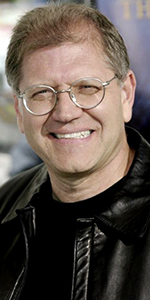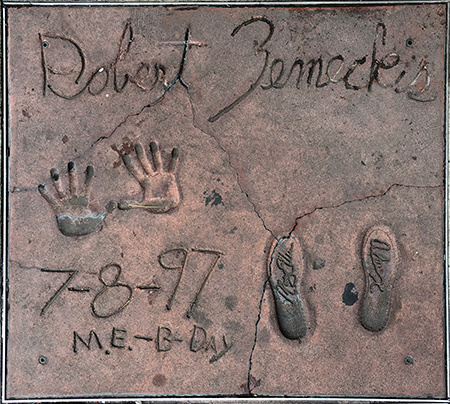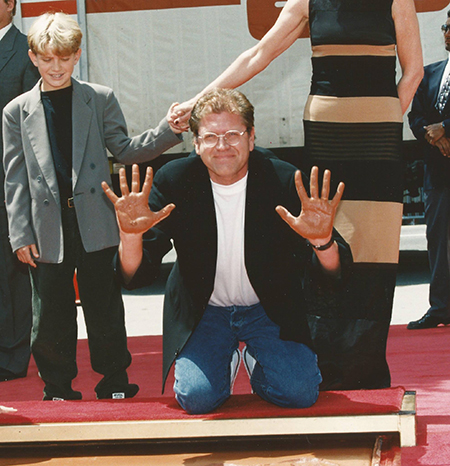 |
 |
 |
 |
 |
| Robert Zemeckis. Circa 2004. |
| |
|
 |
| |
 |
| |
 |
| |
 |
| |
 |
| |
|
|
| Robert Zemeckis |
 |
| Forecourt Ceremony held on Tuesday, July 8, 1997 |
| |
Born: May 14, 1952, in Chicago, Illinois
Age at the time of the ceremony: 45 |
| |
Robert Zemeckis is one of Hollywood's best-known directors. An astute showman, gifted filmmaker, and busy producer on films he directs as well as those he doesn't, Zemeckis has, on occasion, out-Spielberged even Steven Spielberg.
Zemeckis grew up on the south side of Chicago, in what he has described as a bookless, musicless, theatreless home. Naturally, the young boy became obsessed with television! At an early age, Robert began making films with the family 8mm movie camera. After seeing Bonnie and Clyde (released in September 1967), Zemeckis knew what he wanted to do. His parents felt that he was reaching for the stars. . .
After attending Northern Illinois University and cutting news footage at the NBC affiliate, Zemeckis had to beg to be allowed to attend the Cinema School at the University of California. His hardscrabble Chicago background helped him face much of the rejection Hollywood would offer him. Graduating in 1973, Zemeckis showed his student film A Field of Honor to Steven Spielberg, who loved it, and who became a mentor to the lad (although he was only six years older).
Spielberg produced Robert's first studio movie
I Wanna Hold Your Hand (released in April 1978) with Nancy Allen, then, he and writing partner Bob Gale, wrote the script for Spielberg's 1941 (released in December 1979), with John Belushi. Undaunted, they all three worked on Robert's next directing effort, Used Cars (released in July 1980) with Kurt Russell.
It was Michael Douglas who produced and starred in what might be considered Zemeckis' first hit: Romancing the Stone (released in March 1984), but Zemeckis and Gale had a script Spielberg just loved called Back to the Future (which was released in July 1985) with Michael J. Fox. It became a monster hit.
His next film is considered the last hurrah of conventional animation:
Who Framed Roger Rabbit (released in June 1988) with Bob Hoskins, combined animation with live action in one of the most popular releases of that year.
Zemeckis became the executive producer for 93 episodes of Tales from the Crypt, aired over HBO from June 1989 to July 1996, and banged out both Back to the Future Part II (released in November 1989), and Back to the Future Part III (released in May 1990) in short order. His dark comedy Death Becomes Her (released in July 1992) with Meryl Streep, didn't fare so well, but it is always darkest before the dawn.
Forrest Gump (released in July 1994) with Tom Hanks, was a three-hour tour de force, combining humor and pathos in the life story of a simpleton, who interacts with famous people. The film was not only a whopping hit, but it brought Zemeckis the Best Director Oscar, as well as an Oscar for Tom Hanks, and the Best Picture Oscar.
Robert's interest in the sciences led to his post-Gump "bet-the-farm" film of astronomer Carl Sagan's Contact (which played the Chinese in July 1997) with Jodie Foster. If nothing else, it has the greatest opening scene in a movie since Things to Come (released in September 1936).
This led to him being executive producer for the ten episodes of Perversions of Science, aired over HBO in 1997.
After taking it easy for a bit, Zemeckis returned to direct
What Lies Beneath (released in July 2000) with Harrison Ford, and then turned in his masterpeice, Cast Away (released in December 2000) where Tom Hanks, armed only with a volleyball, captured romantics everywhere.
He worked with director Ridley Scott on Matchstick Men (released in September 2003), then led the charge into computer performance-capture with Tom Hanks in The Polar Express (released in November 2004). He was one of eight producers for House of Wax, with Paris Hilton ( ! true story!) (released in May 2005), and was executive producer on Monster House (released in July 2006).
Performance capture propelled his adaptation of Beowulf (released in November 2007) with Ray Winstone, while he was one of 11 producers on Gothika (released in November 2008), with Halle Berry.
Zemeckis, raised a Catholic, helmed the CGI animated
A Christmas Carol (released in November 2009) with Jim Carrey, then directed Flight (released in November 2012) with Denzel Washington, and The Walk (which played the Chinese in October 2015) with Joseph Gordon-Levitt.
The World War II set
Allied (released in November 2016) with Brad Pitt, kinda went nowhere. Zemeckis was exec producer on Manifest, airing over NBC beginning in September 2018, as well as Medal of Honor, streaming over Netflix beginning in November 2018. His next film was Welcome to Marween (released in December 2018) with Steve Carell. He directed a remake of Roald Dahl's The Witches with Anne Hathaway (released in October 2020). Zemeckis directed the live action remake of Pinocchio with Tom Hanks (released in September 2022).
Zemeckis placed Tom hanks and Robin Wright in Here , which had its World Premiere at the Chinese on Friday, October 25, 2024. |
|
|
|
|
| |
 |
 |
| Mann's Chinese Theatre, Hollywood, California. Robert Zemeckis Forecourt block. Executed by unknown, Tuesday, July 8, 1997. 49 x 44 inches. |
 |
 |
 |
Mann's Chinese Theatre, Hollywood, California. Robert Zemeckis Forecourt ceremony, Tuesday, July 8, 1997. Zemeckis shows his mitts while son Alex, who holds hands with his mother, Mary Ellen Trainor. |
|
|